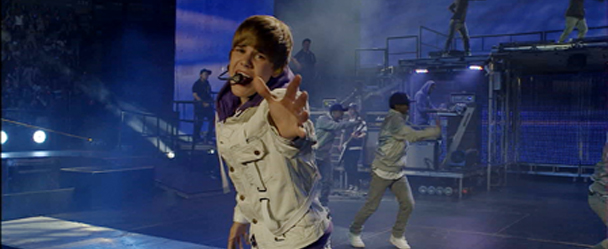Never Say Never
The way I see it, there are two types of people in the world: Justin Bieber fans, and, er, everybody else.
Plot summary
A rare inside look at the rise of Justin Bieber from street performer in the small town of Stratford, Ontario to internet phenomenon to global superstar.

The way I see it, there are two types of people in the world: Justin Bieber fans, and, er, everybody else.
Members of the first group are looking forward to Never Say Never, Bieber’s film half chronicling his rise to fame, half looking at his path towards selling out Madison Square Garden, with the anticipation of 1000 comic-con veterans meeting Stan Lee. The other group look on dumbfounded, completely unaware of what occurred in the last year or so to warrant this small little R’n’B singer making a film about his very short life.
The first group are actually a bloody committed lot, and there’s quite a few of them too, making this film a sure fire box office hit (due in part to the fact that admissions will nearly double from all the parents begrudgingly taking their daughters). Indeed to the uninitiated, the sheer ferocity and scale of Bieber’s fandom could come as quite a shock watching this film. He has over 7 million followers on Twitter alone. And counting.
And it’s this connection with his fans; this unusual Internet born and bred phenomenon that the movie tries to get across. Starting off on YouTube, Bieber garnered huge amounts of hits for his videos where he sung songs by artists such as Stevie Wonder and Usher. Noticing this, Scooter Braun, his current manager, grabs the opportunity to try and make something of Bieber, introducing him to Usher, taking him round the entire US radio circuit until he finally develops a following. Now a fully-fledged phenomenon, Bieber still keeps in contact with his fans directly through Twitter and Facebook. Twitter features heavily in the film too, Justin’s conversations with fans or tweet updates on his whereabouts popping up on the screen like annoying, well, pop-ups.
Annoying at times they might be, director Jon Chu has done well to show us the zeitgeisty nature of Bieber’s existence – the first true internet pop star with unprecedented contact and connection to his fan base. He’ll leave rehearsal and update everyone on how it went. The screen is sometimes layered with YouTube videos or tweets in a way that represents the prolific immediacy of Bieber’s narrative through the world.
The film also does well to chronicle Bieber’s childhood. We get a real sense for his prodigious music talents (annoyingly as a small child he was brilliantly adept at keeping time and learnt to play drums in a family friend’s band) and his obsession with performing. He would often be found busking outside the local theatre in his Canadian hometown, strumming well on a guitar. Being so young, and the story so very, very recent, the film has a library of videos and photos to utilise in showing Bieber’s upbringing.
This is all intercut with Bieber’s Tour in the US, selling out huge arenas, packing them full of hysterical girls, and his development under Scooter’s guidance, naturally with some full length 3D show tunes (no horror film will scare me quite as much as Justin Bieber’s hand slowly reaching out to my face as he soothingly sings me a love song). We get a sense for his huge entourage on tour, which becomes something of a family, alongside Bieber and his mum, and the mind-bogglingly crazy nature of his plague of fans. He is happy, it seems, to poke fun at himself too as, in the weirdest scene of the film, Bieber’s face (in 3D!) looms out of the screen, whipping his hair back and forth in slow motion, taking the piss out of everybody continually commenting on his glorious hair.
The film even has an arc, if you like, quite cleverly crafted by Chu and Braun. But herein lies the problem. The whole film is focused towards this one moment, this huge goal: selling out Madison Square Garden. There is even a moment where Bieber gets infected vocal chords, possibly missing out on performing. It would make it all super tense and nerve racking if you didn’t already know he performs. But the whole film is aimed at this moment; this is what they said we couldn’t do, what was never possible (cue title song).
Never Say Never refers to an actual Bieber song. Fine. But to suggest that his career has been an uphill struggle, such a challenge to prove everybody wrong and finally succeed in selling out the mythical “MSG” when the reality is that his career has been going for all of a couple years, seems like too audacious a concept. The kid works hard, but come on, it’s been a cake walk in terms of career momentum. All this is architected throughout the film by Scooter Braun, who is the most interviewed member of the team, and practically narrates the whole sycophantic affair.
So it’s hard not to see the film as, essentially, propaganda, albeit fairly fun propaganda. It’s created such a sympathetic view of Bieber you feel like it is actively trying to turn all the haters into believers – sorry – Beliebers. If you can get past that it works well as a concert film/documentary and will certainly leave Bieber fans frothing at the mouth. But, if not, it has little appeal past the point of finding out how he got where he was, maybe realising that he isn’t quite as annoying as his songs suggest, and laughing at his insufferable fans.












COMMENTS